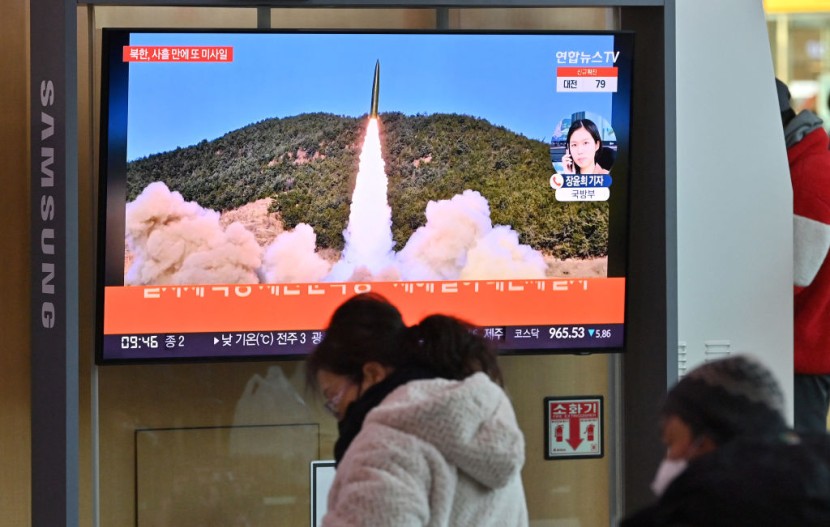
North Korea fired two presumed ballistic missiles from an airport in capital Pyongyang on Monday, the fourth test this month displaying the advancement of its missile capabilities, according to South Korea's military.
According to South Korea's Joint Chiefs of Staff (JCS), the missiles, suspected as short-range ballistic type, were fired east from Sunan Airfield in Pyongyang. The missiles traveled about 380 km (236 miles) to a maximum altitude of 42 km (26 miles), as per Al Jazeera.
Japan's chief cabinet secretary Hirokazu Matsuno condemned the latest missile launch as a threat to peace and security while Chinese foreign ministry spokesman Zhao Lijian called on "relevant sides" to maintain the "overall peach and stability on the peninsula," as per Reuters.
Before the launch on Monday, North Korea had already conducted three missile tests in less than two weeks. According to reports, earlier missile launches involved sophisticated hypersonic missiles, which can travel at incredible speeds and pose a challenge to missile defense systems.
Japanese Defence Minister Nobuo Kishi said the missiles seemed to have crashed in the ocean near North Korea's east coast. He added that the series of launches appears that North Korea boosts its missile technology.
Kishi noted that North Korea's continued weapons testing violates UN Security Council resolutions that prohibit Pyongyang from developing all kinds of ballistic missiles.
"The repeated launching of North Korea's ballistic missiles is a grave problem for the international community, including Japan," Kishi told the members of the media.
Continued Missile Launch Are A Cause For Alarm
A spokesperson of the US State Department condemned the new ballistic missile launches that are against UN Security Council policies. The official added that North Korea's continued firing of missiles threatens its neighbors and the international community.
"We remain committed to a diplomatic approach to the DPRK (Democratic People's Republic of Korea) and call on them to engage in dialogue," the spokesperson said.
Meanwhile, the US military's Indo-Pacific Command said the missile launches are "the destabilizing impact" of North Korea's unlawful weapons development program. However, the Monday launch did not pose an immediate threat to the United States and its allies.
However, according to Professor Mason Richey of Hankuk University of Foreign Studies in Seoul, the rapid pace of weapons testing indicated that North Korea holds enough missiles to utilize in tests, training, and demonstrations. It also bolstered its confidence by highlighting the size of its arsenal.
North Korea: Denuclearization Talks, Not This Time
The latest launches of Pyongyang have prompted both condemnation and an appeal for dialogue from US President Joe Biden's administration, which has imposed fresh sanctions on North Korea.
On Wednesday, the US has imposed sanctions and called on the UN Security Council to blacklist several North Korean personalities and entities. It also urged North Korea to resume its talks on denuclearization, as per CBS News.
In the 10th year of his regime, North Korean Kim Jong Un committed to devoting a larger portion of the country's budget to military development, citing the rising instability on the Korean peninsula as justification.
Despite the health and economic effects of the ongoing Covid-19 pandemic, Pyongyang has already begun spending about a quarter of its gross domestic product on weapons, which is more than any other country.
Related Article : North Korea Launches 2nd Possible Ballistic Missile In 6 Days Amid International Objection
© 2026 HNGN, All rights reserved. Do not reproduce without permission.








